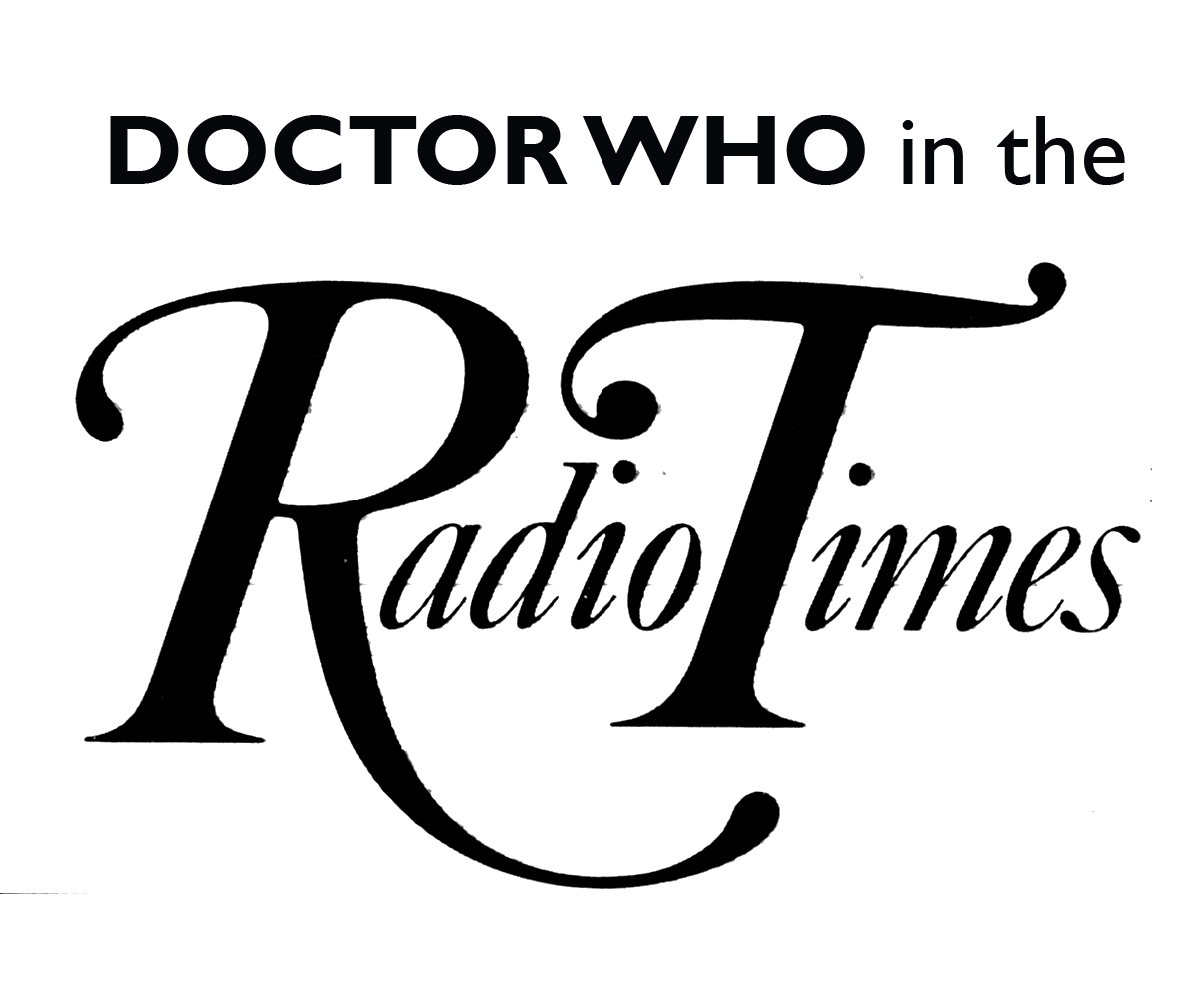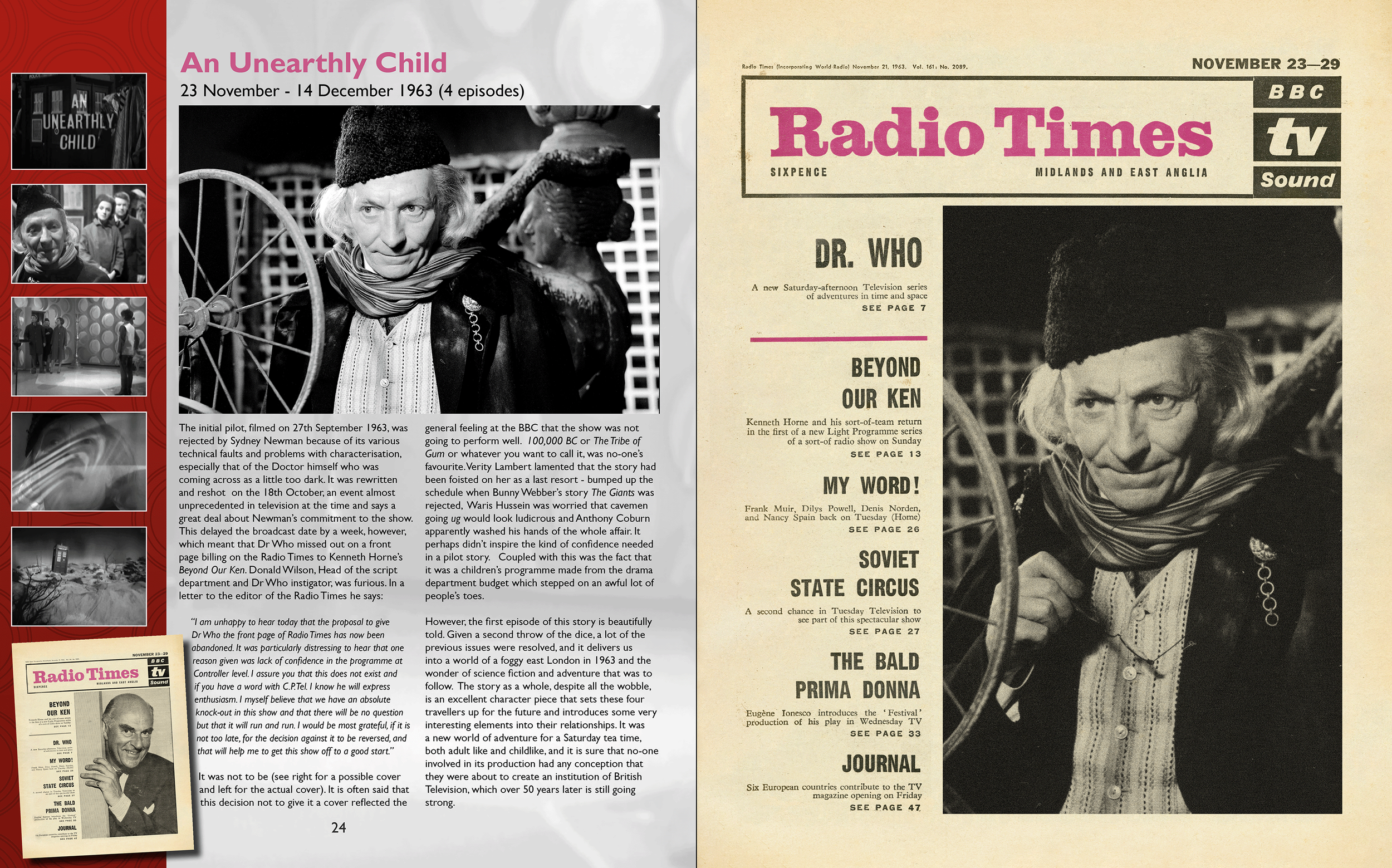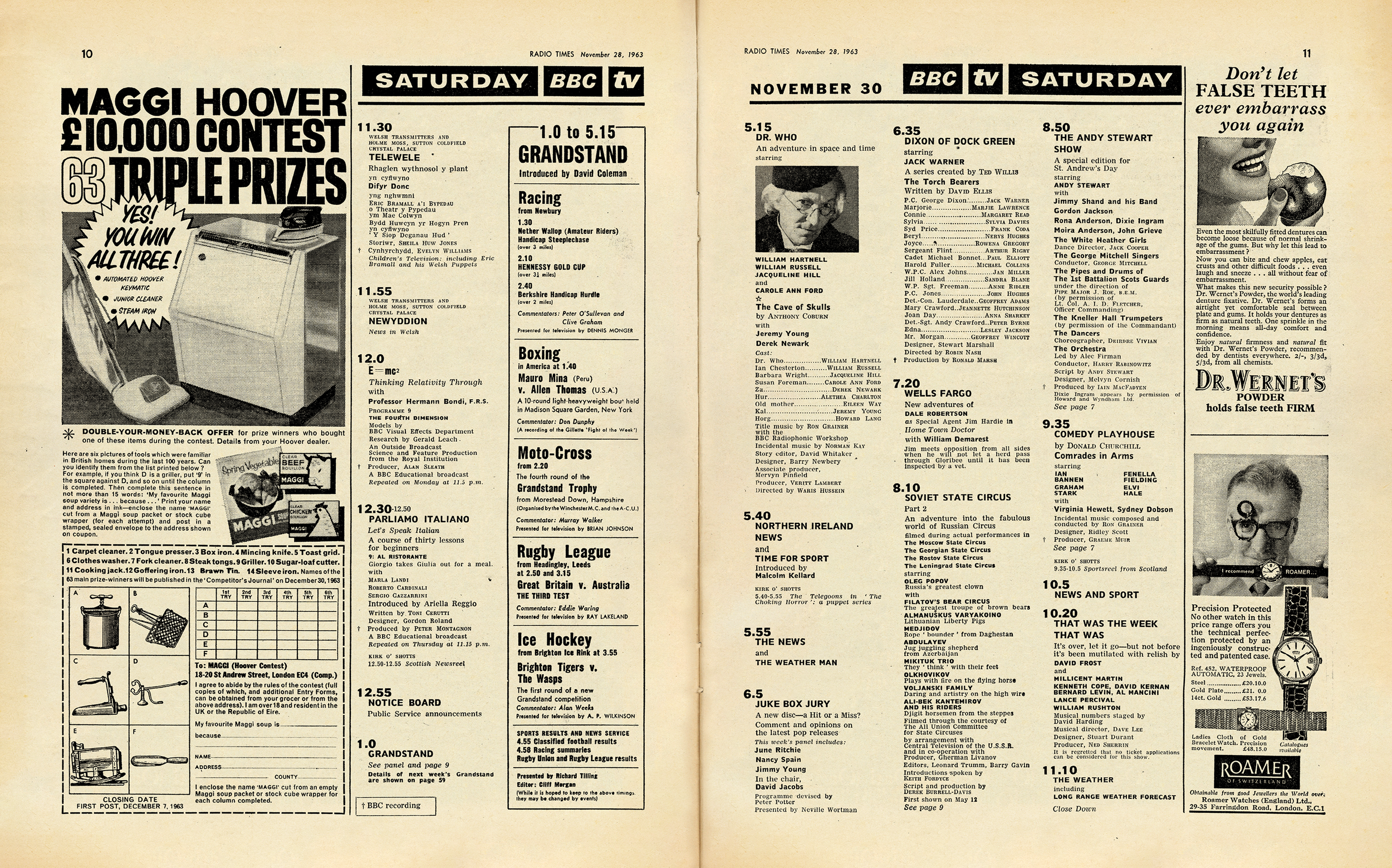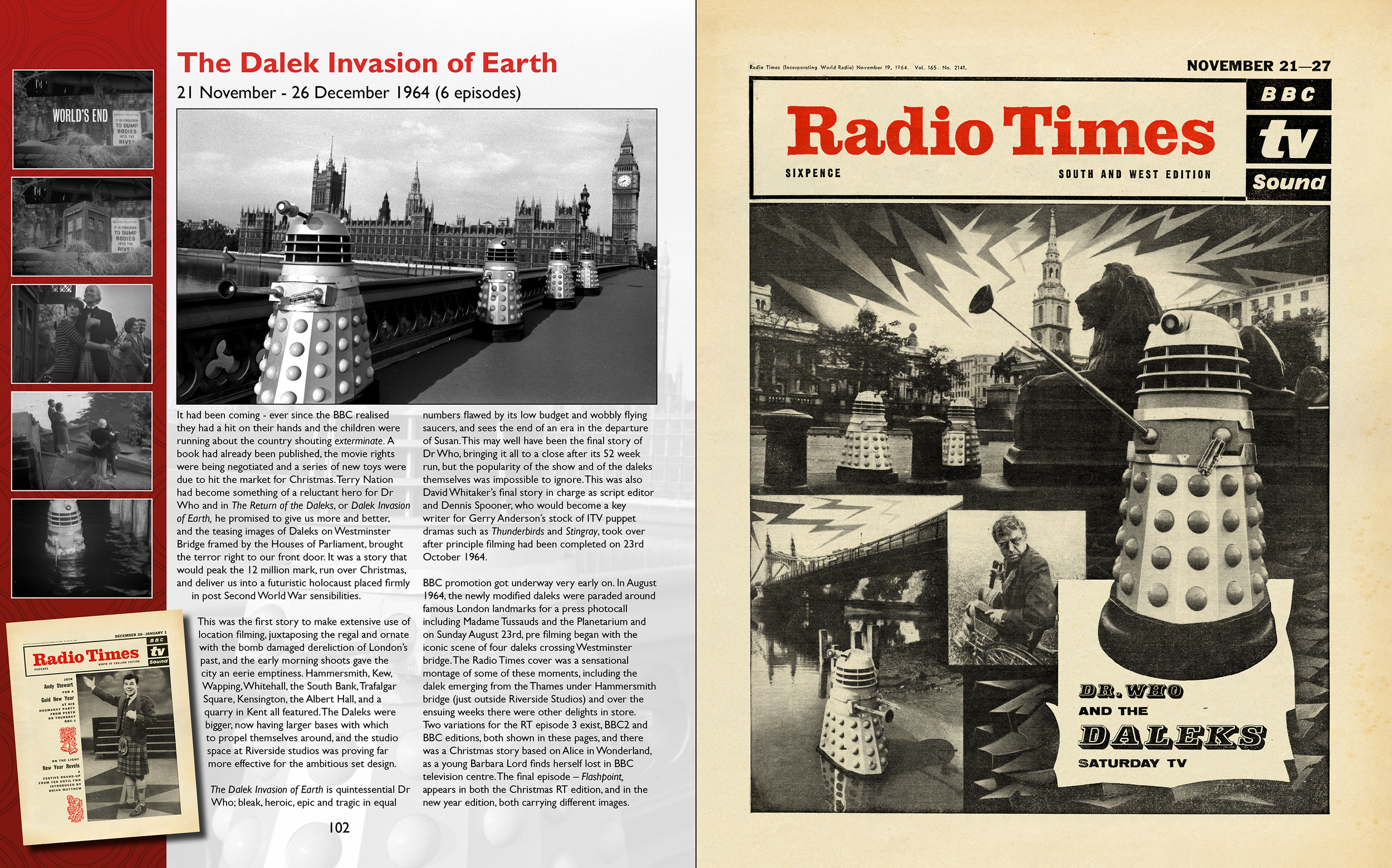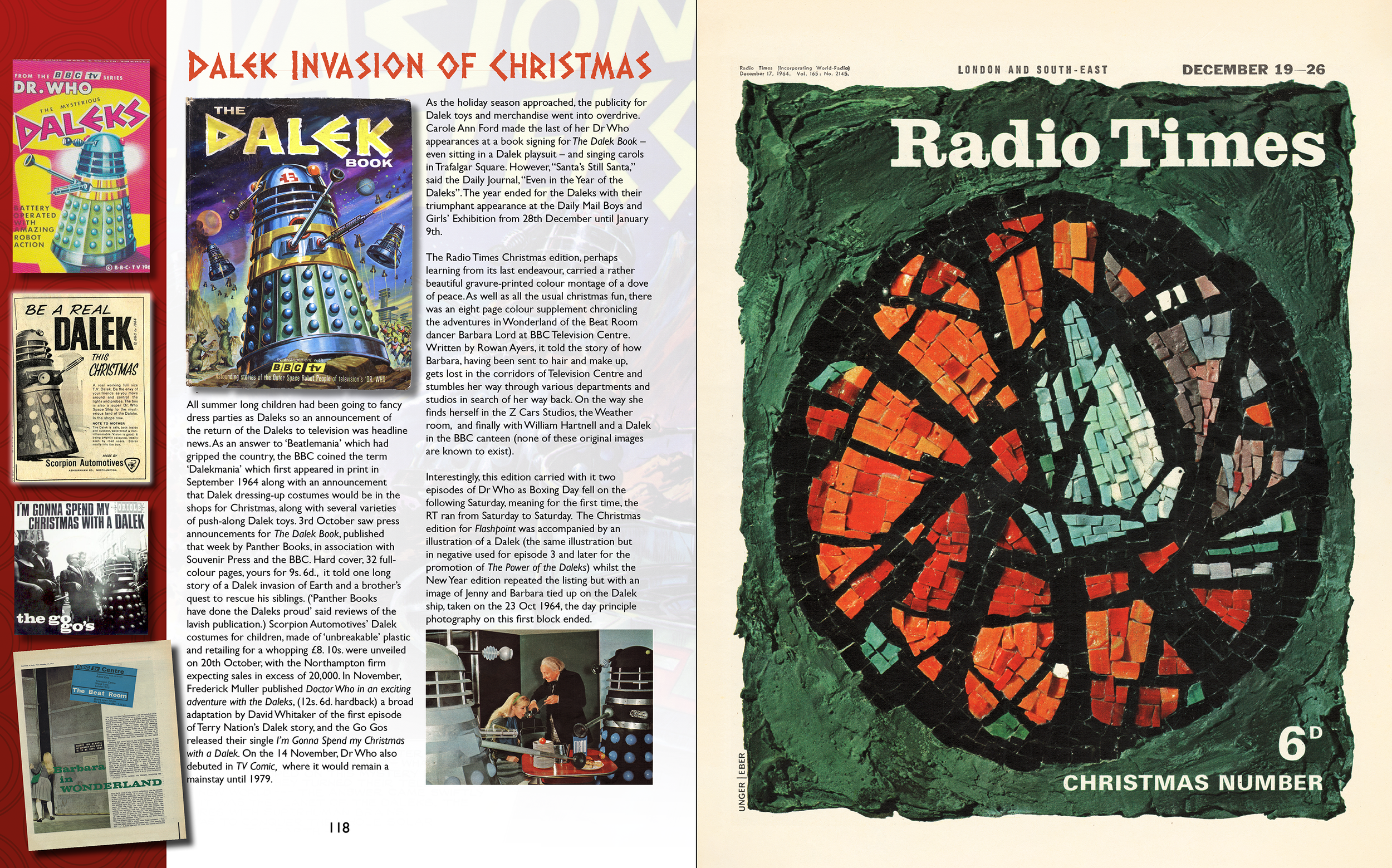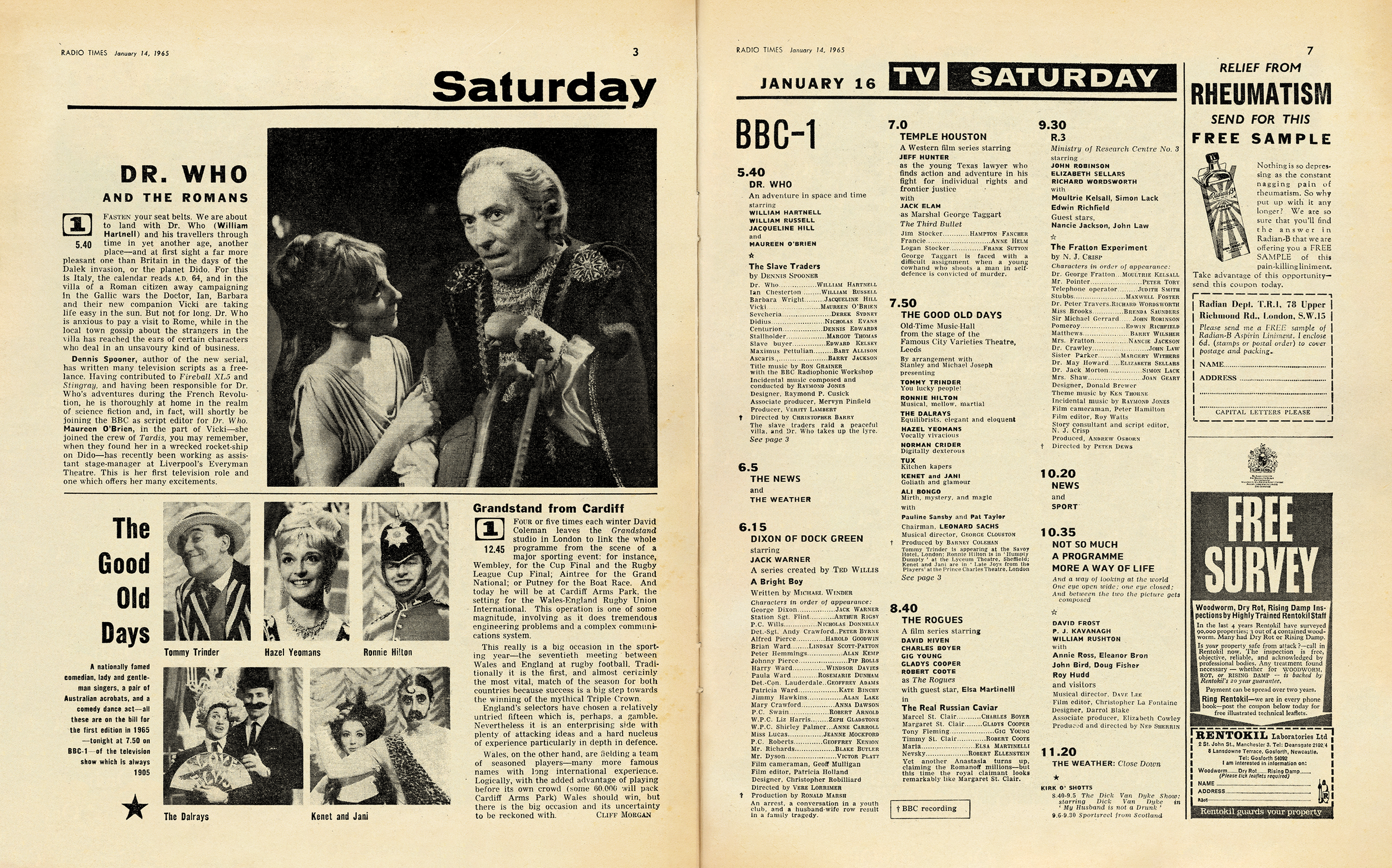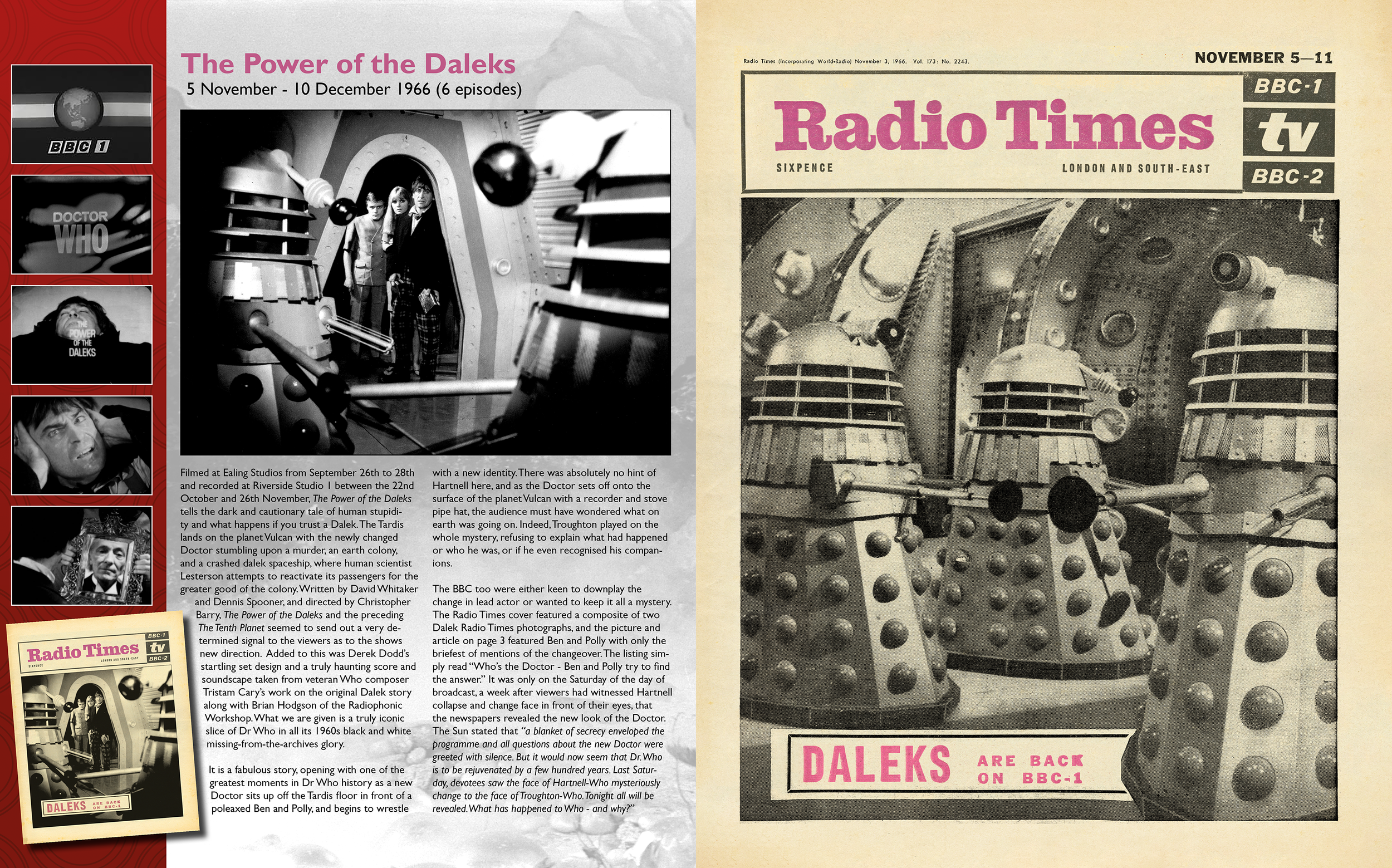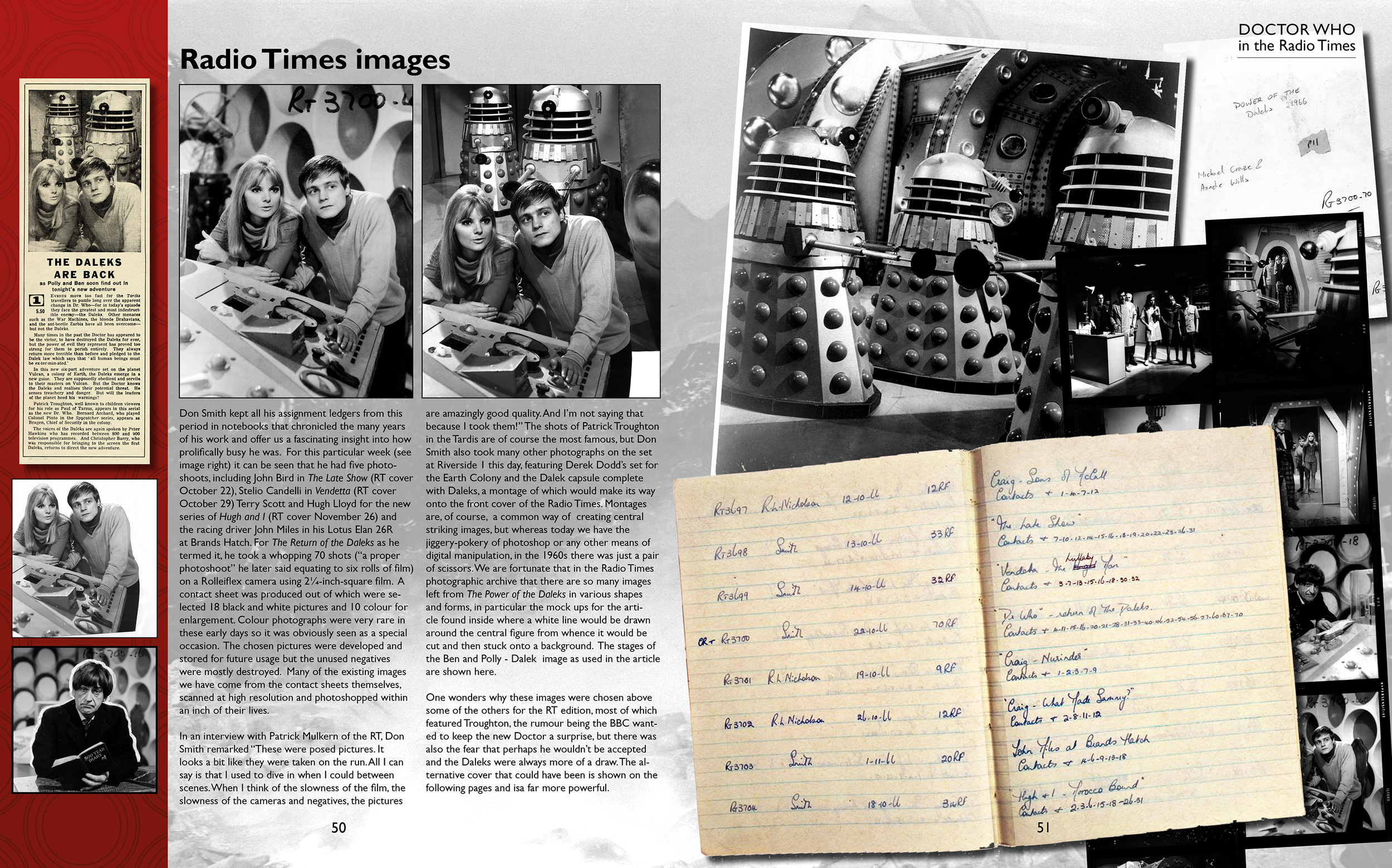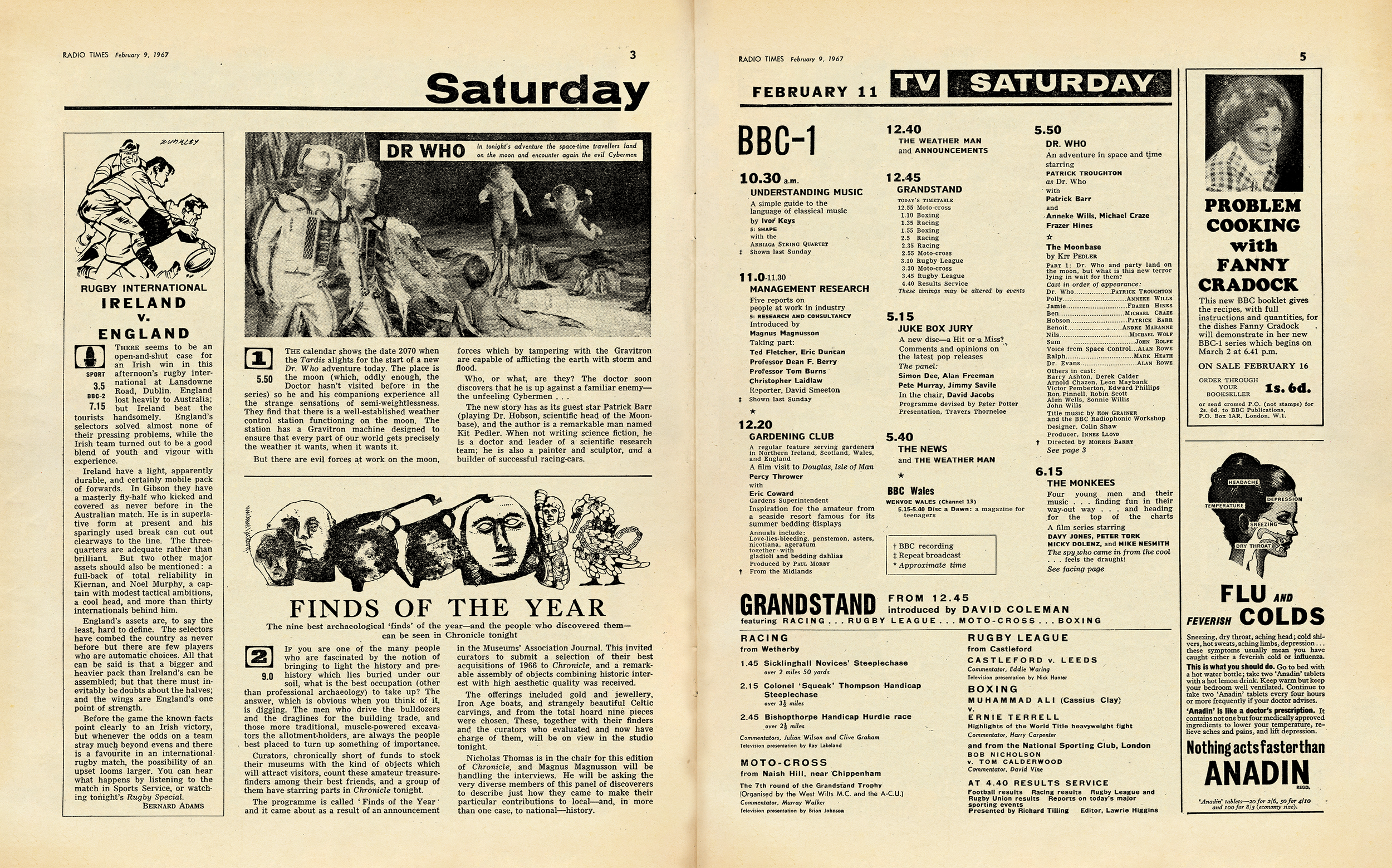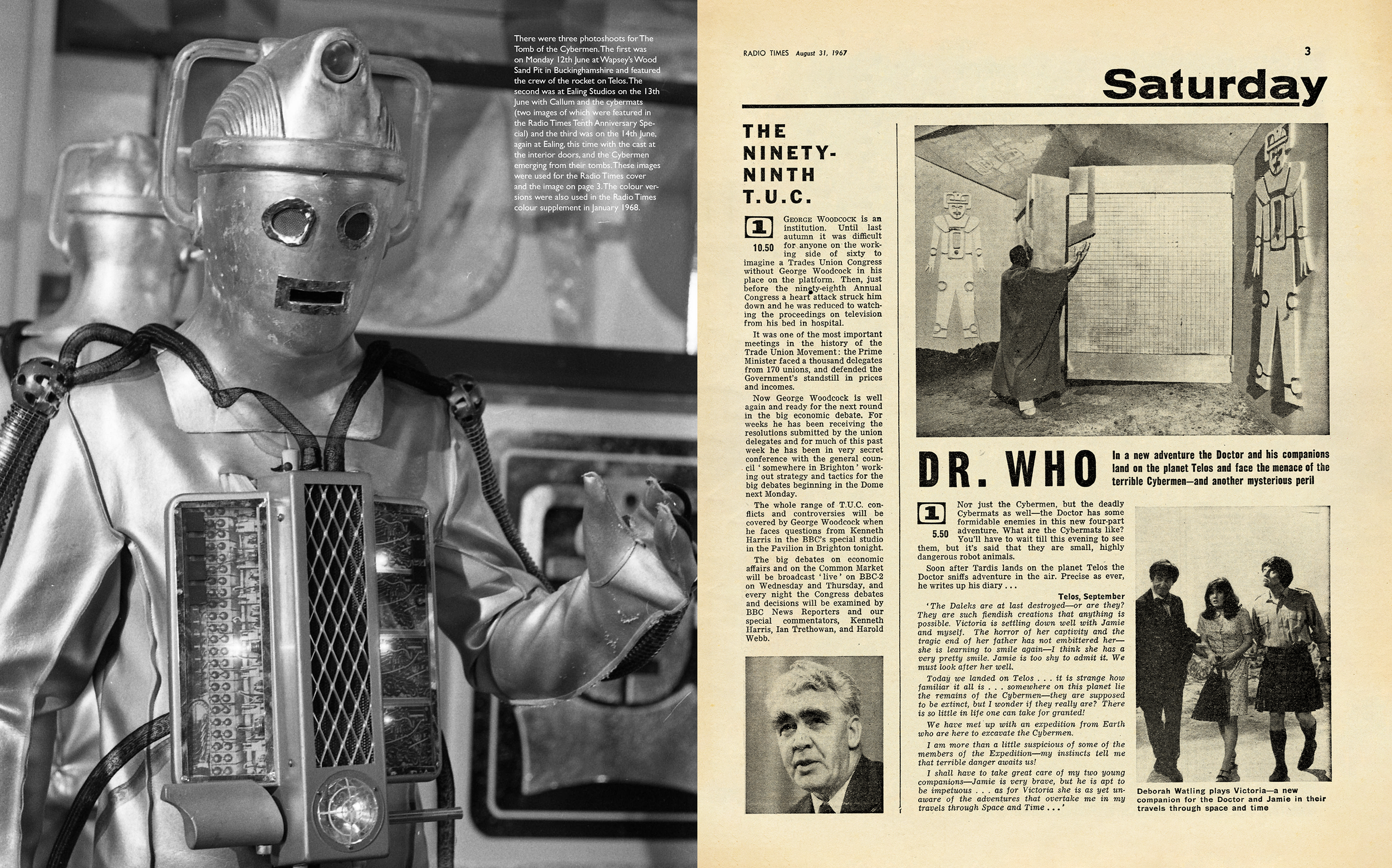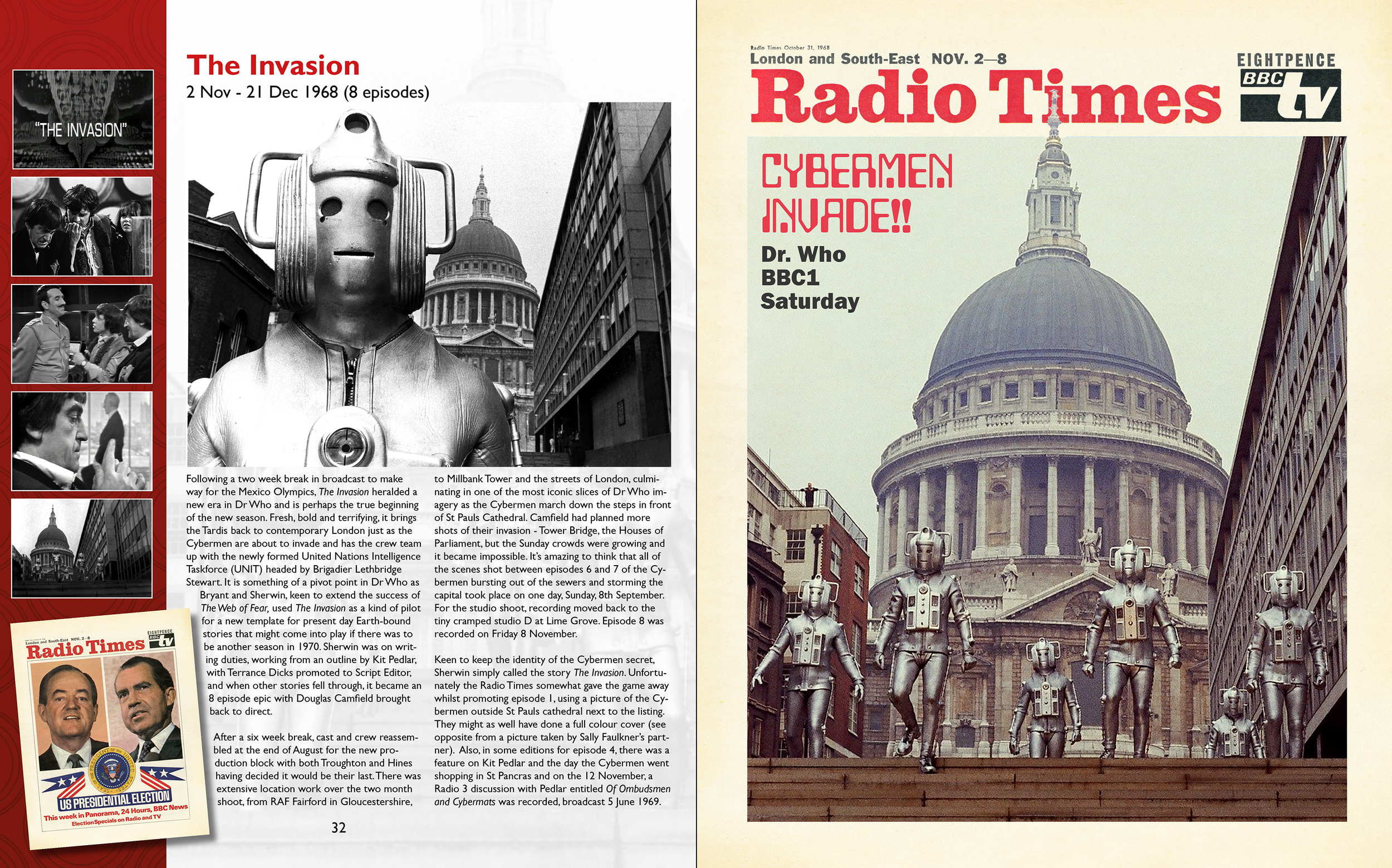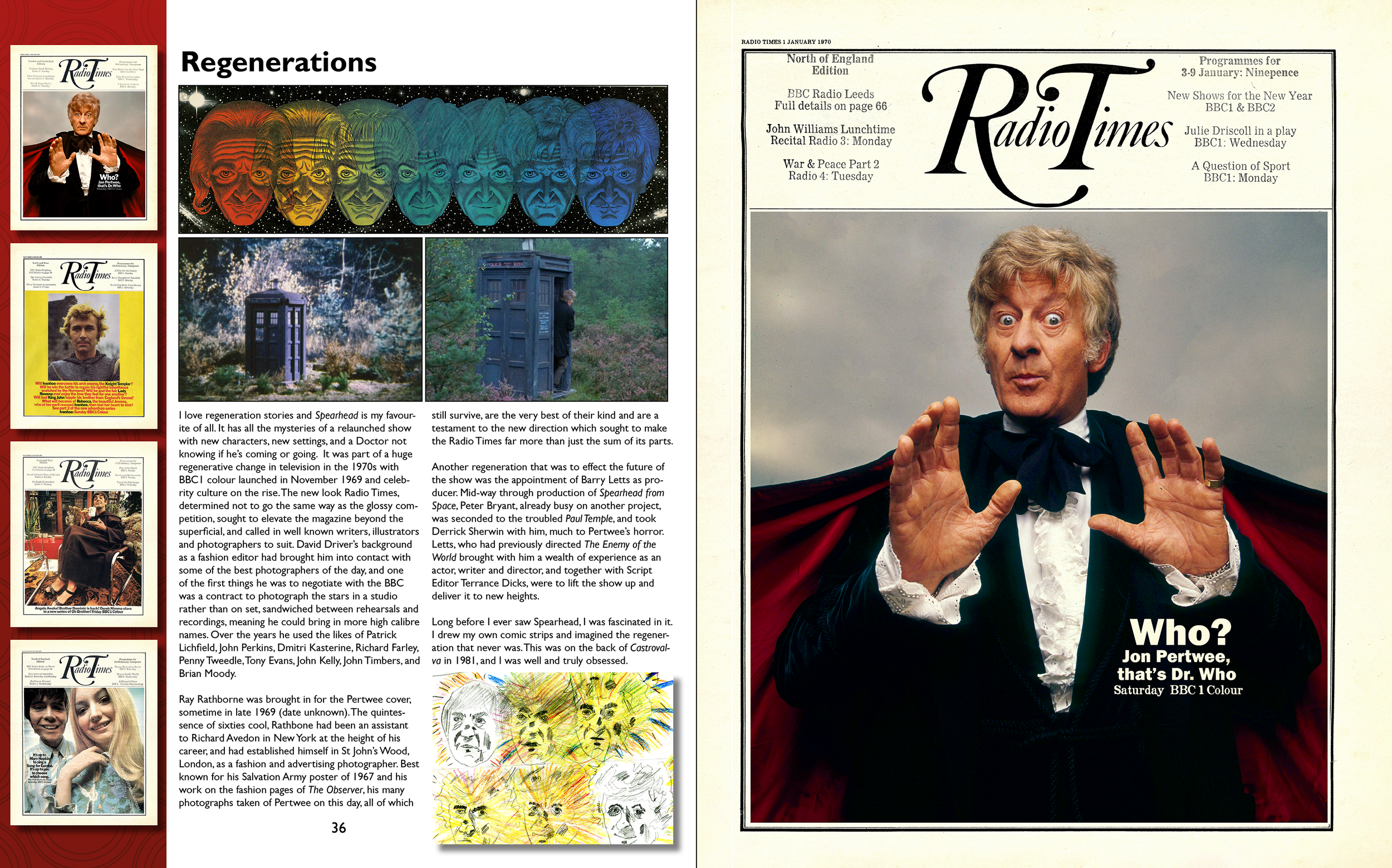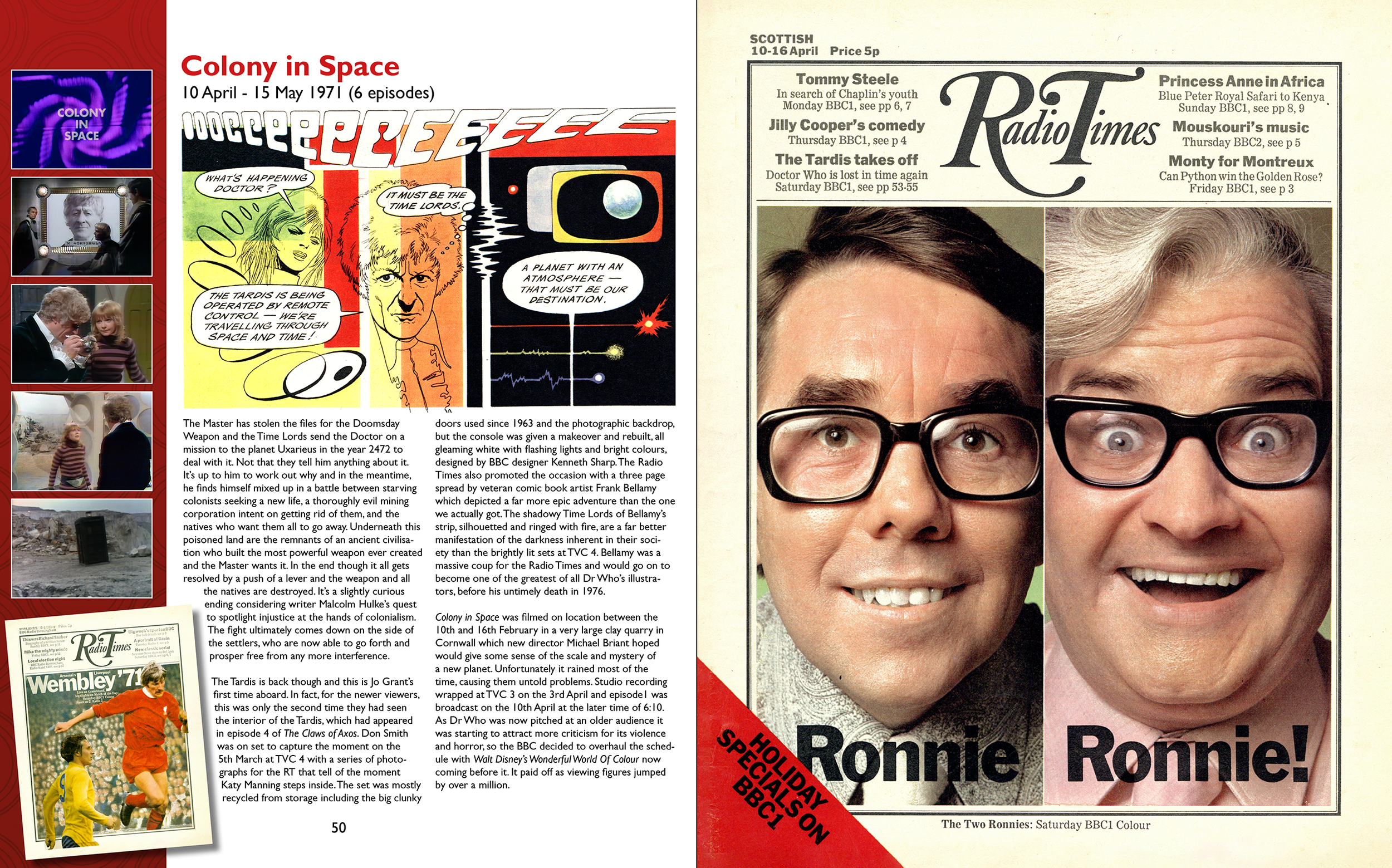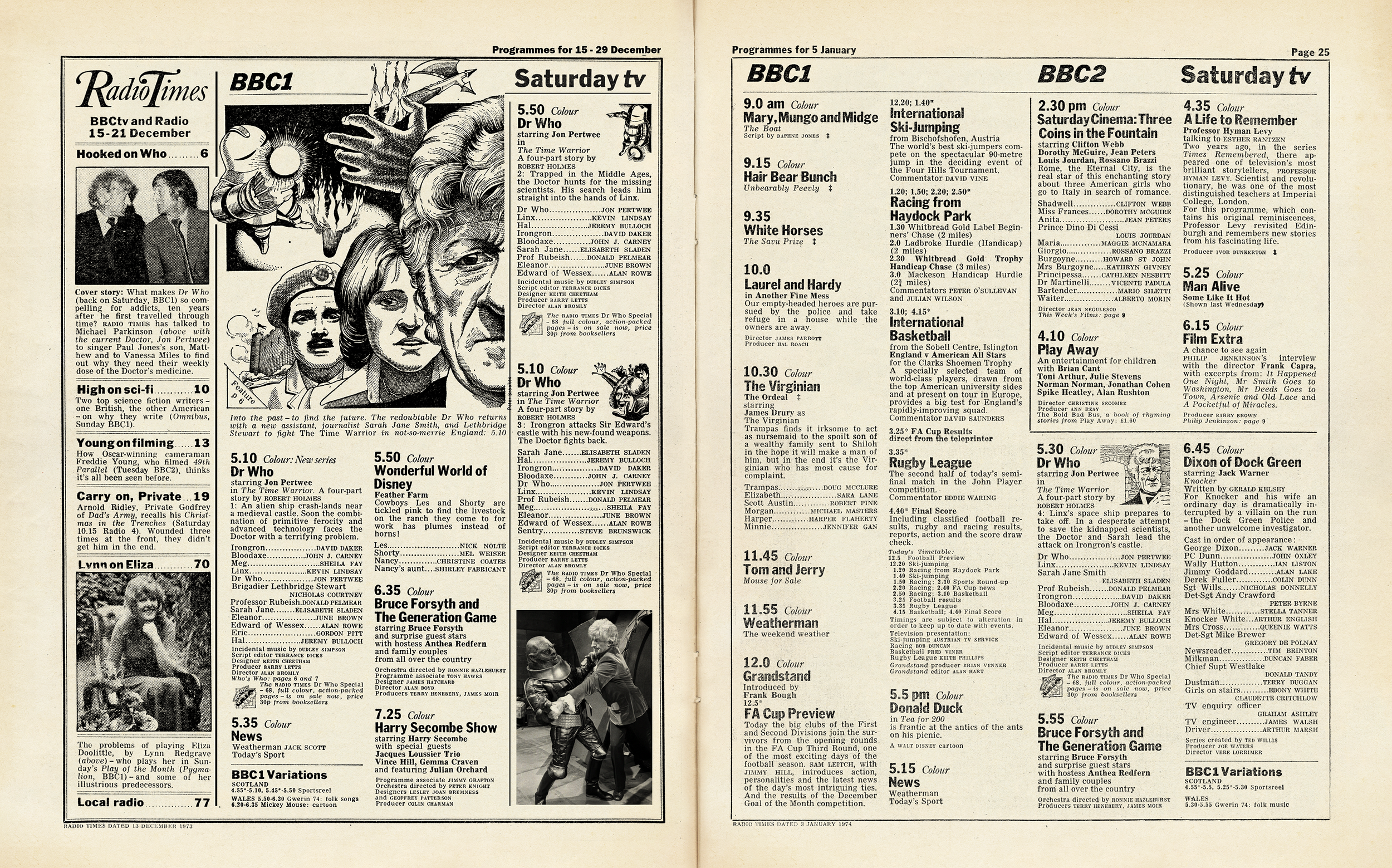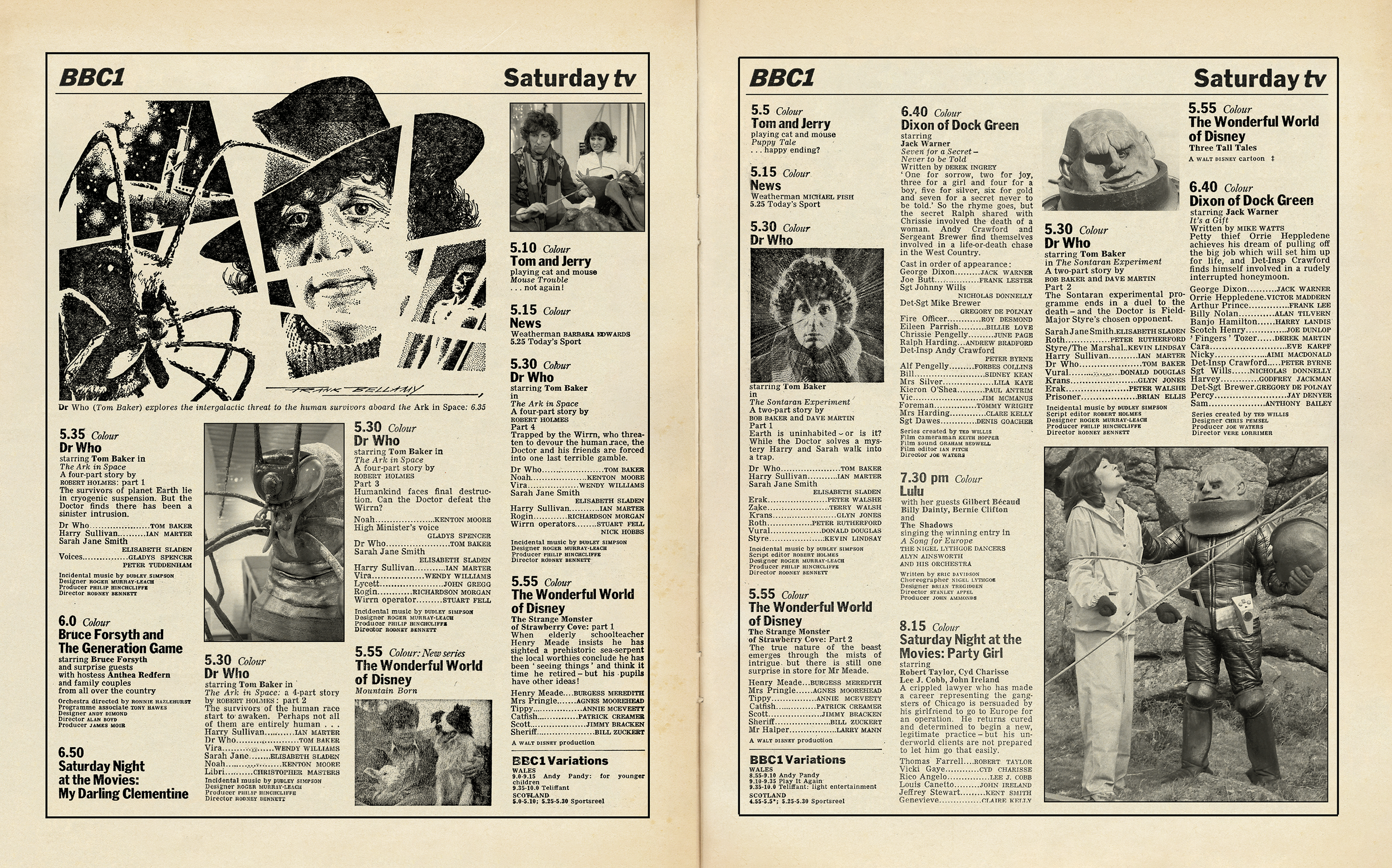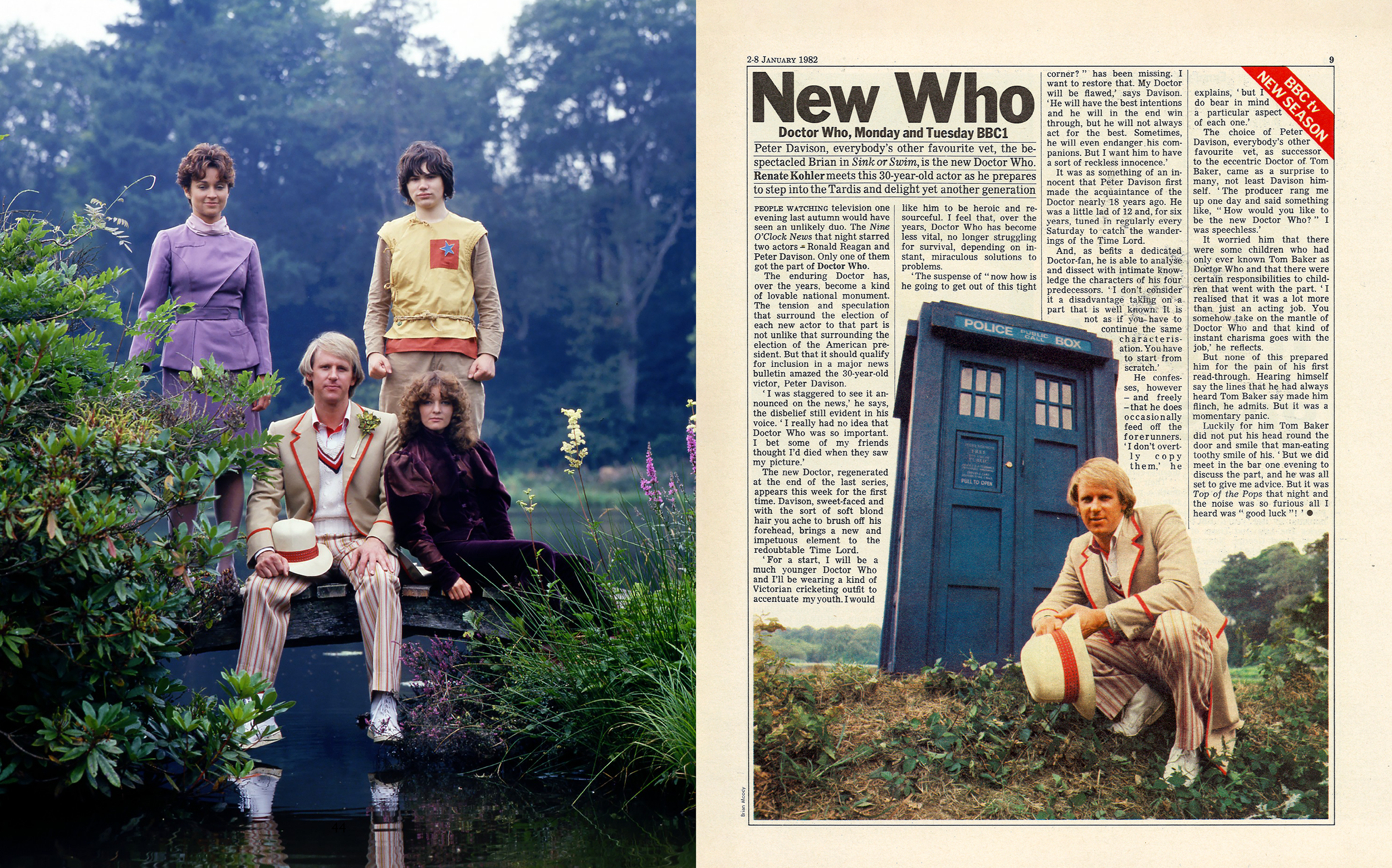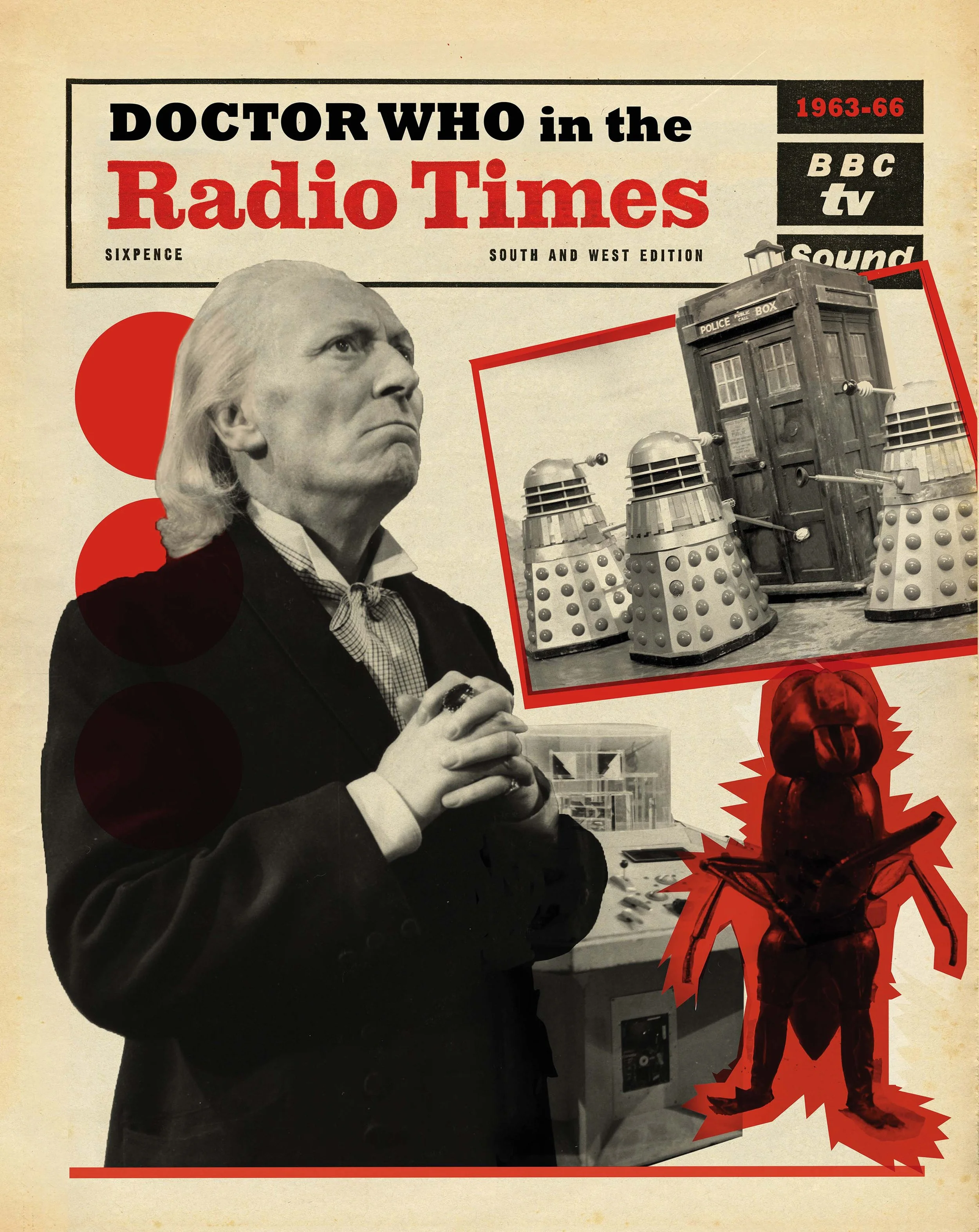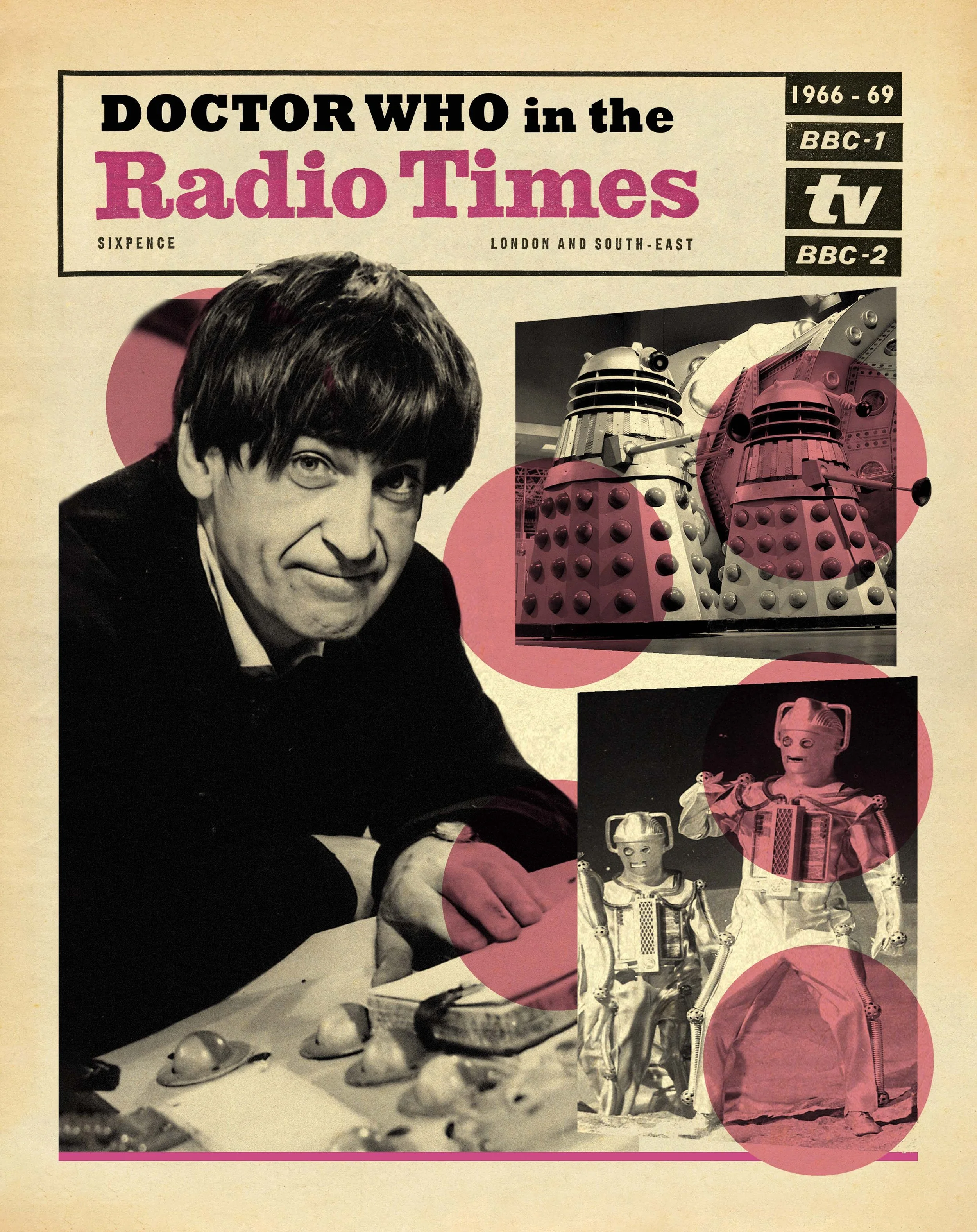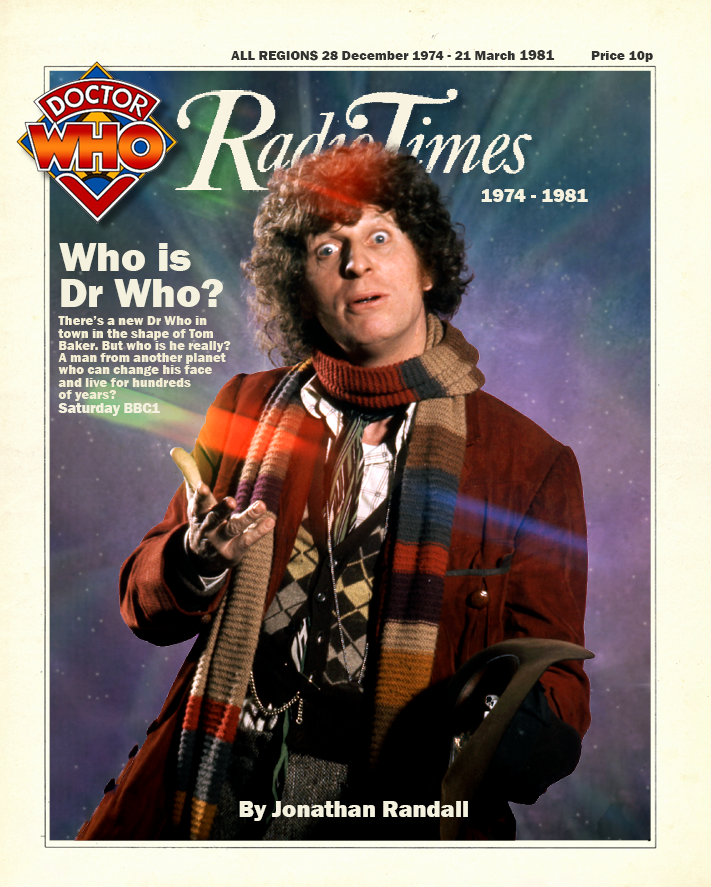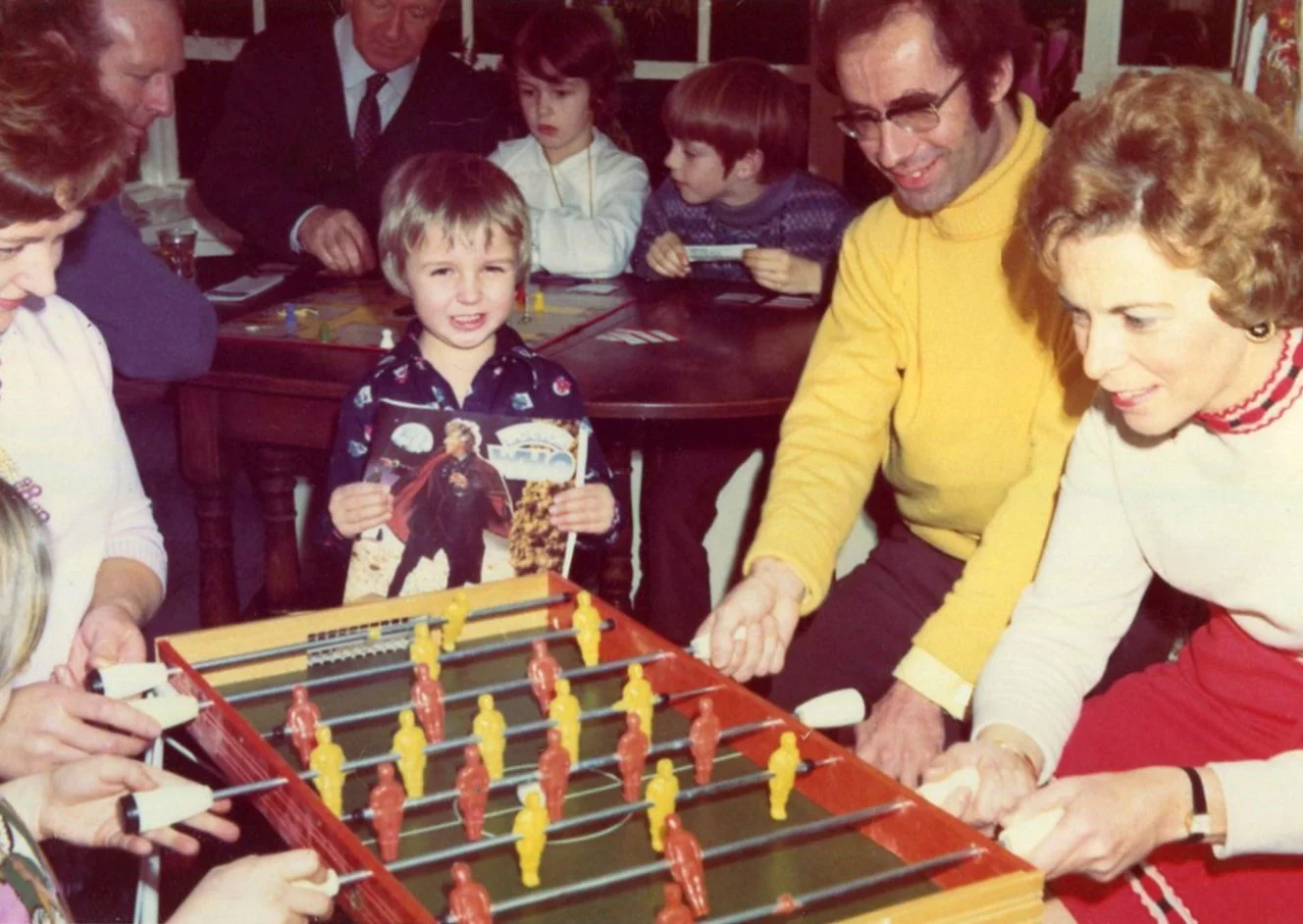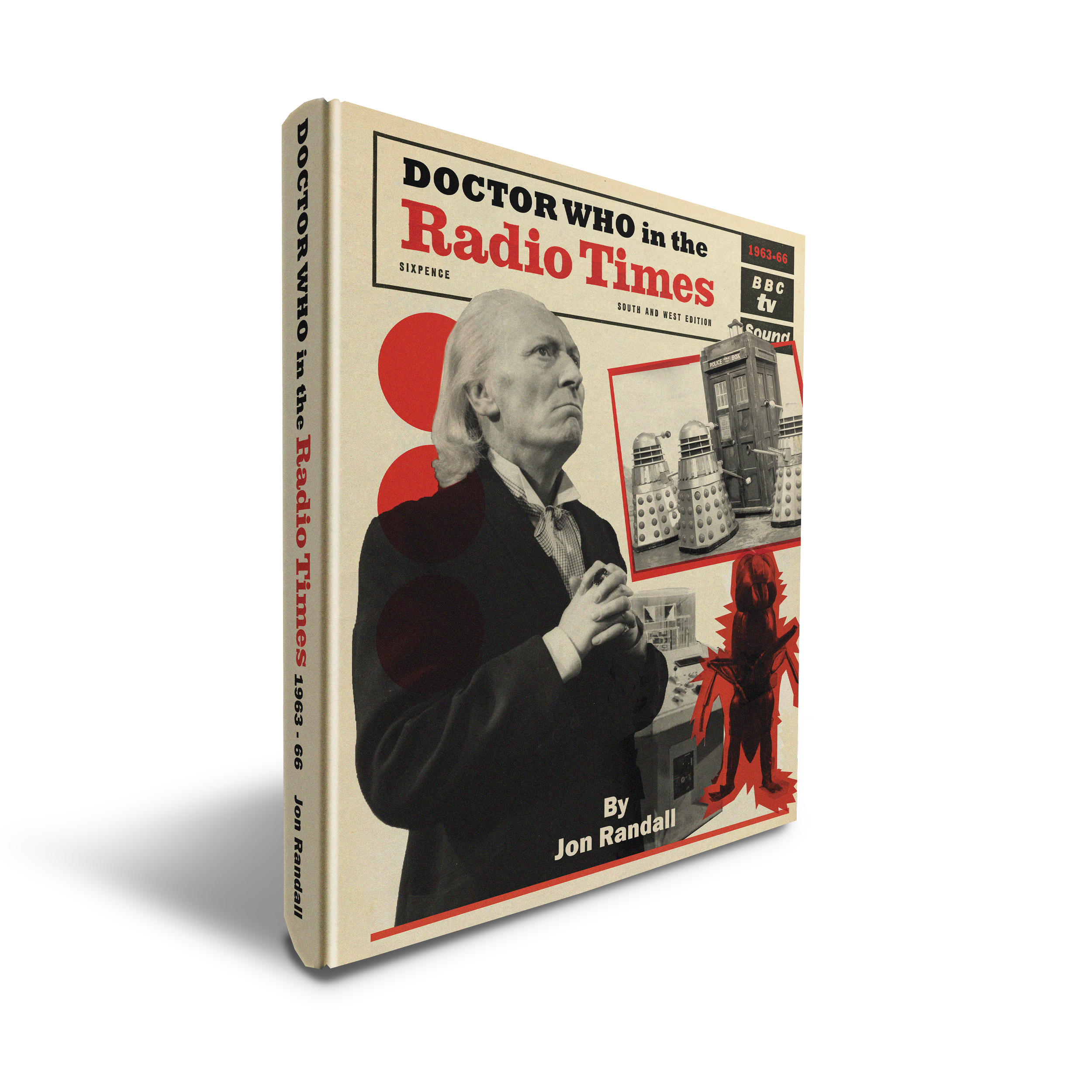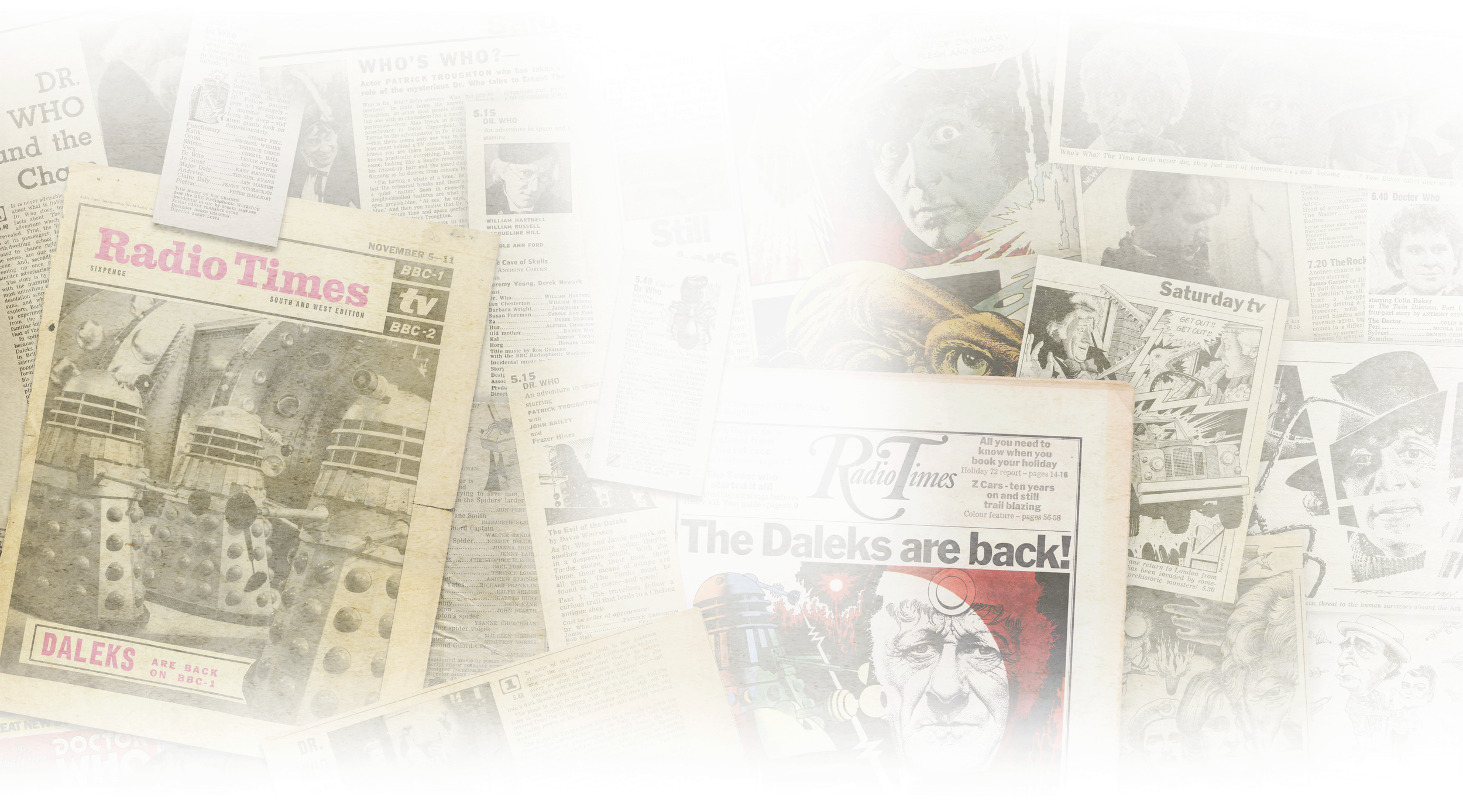
DOCTOR WHO in the
1963 - 1989
A Digital Scrapbook and Archive
By Jonathan Randall
A history of Doctor Who as told through the pages of the Radio Times, 1963 - 1989, with full listings, covers, articles, original photographs and things that never were. Enjoy.
I’ve always been Dr Who bonkers. I can’t explain it to any but the very few but it has run through my life like a spine. Of course it has come and gone, almost disappeared at times, but it’s always been there, in my bones, rattling around my brain, as if being part of the very fabric of my being. Who can say why? I can’t. I liken it to the passion people have for their local football team, an unyielding love and devotion that brings them a sense of belonging, home, meaning and identity with all of the highs and lows and hopes and disappointments of new managers, new directions, new players and what ifs. It’s never the individual stories that do it for me, Dr Who is far more than the sum of its parts, it is the grand narrative of it all that excites, and at the very centre of it all a being with such moral integrity, such wanderlust and hope, a rebel traveller who escaped the confines of his own people, exploring the whole of space and time in a quest for that perfect society, that world that might just have found the answers to it all, righting injustice and fighting dictatorships on the way, dying and regenerating into new forms, new genres, new ideas, new egos; a being with an almost god like view of the Universe bound only by his quest for equality and fairness and the persona he inhabits at the time. That’s what does it.
It always sounds a little obsessive when I waylay this to people who ask, but that’s the truth of it all. I wouldn’t class myself as an out and out Marxist, but at its core, I would say Dr Who does. I once told Terry Walsh (Dr Who stuntman 1966 - 1978) this at the bar during a Dr Who convention in Southampton, 1994, and he was amazed. He said I was the first person who had truly articulated their reverence of the show to him, and when Jon Pertwee sat down next to us, and Terry told him what I had said, Marxist hero and all, Jon Pertwee laughed and said ‘utter nonsense.’ He even told Nicholas Courtney what I had said, and they chuckled away to themselves at the other end of the table. I left quite quickly. It all got a bit awkward.
What it made me realise though, is that Dr Who, the original premise, the renegade traveller in time and space fleeing his home world, was always bigger than the people who made it. When it unleashed itself on the viewing public in November 1963 and then proved it could change its lead in 1966 when Patrick Troughton sat up off the Tardis floor, the programme created a mythology that would forever belong to the fans. Dr Who became an idea, a highly fallible superhero, traversing all sorts of obstacles and injustices both in front of and behind the cameras, giving birth to a whole spectrum of individual creativity, and now, sixty years later, again grappling with reinvention and identity, it continues to push the boundaries and inspire new generations. People complain that it has become ‘too woke’, too political, too left wing, but it is never about sides. It is about understanding the vast myriads of the possibilities of life, and breaking free of the conventions of culture and prejudice. That is why the Doctor left his home world of Gallifrey, and I think I left it with him.
With many thanks to David Miller, Derek Handley, Graham Miller, Kenneth Clark, Romain Potier, Auntie Julie and my Mum and Dad
This a non-commercial venture for research and educational uses. No copyright infringement is intended. The content is non-downloadable and not available as a pdf or printed book.
The Books
Me, Dr Who, and the Radio Times
I was four years old when my father and sister sat me down to watch Jon Pertwee’s first episode of his final season as Dr Who in The Time Warrior. It was December 1973 and Christmas was approaching. I had heard about Dr Who of course, my sister was a big fan, and the occasion was certainly made the most of as I was now deemed old enough to watch what was, I was told, a rather scary and adult show. I guess nothing was to ever prepare me for what came next. The moment at the end of episode one when Lynx the Sontaran removed his helmet to reveal his egg like head was both funny and amazing at the same time, and I was hooked. My sister talked to me long and hard after the episode. She showed me her Patrick Troughton annual from 1969 and tried to explain that the Doctor can change his face. It didn’t really make any sense to me. I was transfixed by the figure of Jon Pertwee who reminded me ever so slightly of my Grandfather – he was dashing and physical and intelligent and to a four year old boy searching for a role model, he didn’t get any better.
Within the week my Dad told me of a magazine that had just been published by the Radio Times that chartered the history of Dr Who from the very beginning, ten years previously. I wanted it. I can remember standing in my parent’s bedroom by the dressing table looking at myself in the full length mirror overcome with delight when My Dad told me my Nan would get it for me as a Christmas present. I had only watched one episode but somehow or another it had made a profound impact on me. Episode two came the following week, and then Christmas. I don’t remember any other present apart from the Radio Times Dr Who anniversary special. My Dad took two photographs of me clutching it to my chest very proudly, never wanting to give it up, and I remember that Christmas night devouring every page of it under the covers.
It was an amazing publication. Even now when I look through the pages it haunts me. The stars didn’t smile in some glossy sales pitch way, they all looked rather serious and scared, all in character, especially all the Doctors who glared out at me behind furious expressions. It didn’t help that, in the magazines attempt to disguise the old black and white photography, it had opted for various tints of orange and green, heaping more and more mystery on the programme’s past as if it were impossible to see it clearly. The magazine is obviously something of folklore within Dr Who circles and was a seminal publication for all concerned. In fact it was lovingly reprinted in 2003 by the Radio Times using as much of the source material as possible although many of the original negatives have been lost to us. It is a magazine that guided my whomania throughout the 1970s and 1980s, and still now I get it out to brood over. It is imprinted on my psychee like nothing else and impossible to describe to only a very few.
I started to collect Radio Times cuttings from then on in. I cut out everything I could find and mounted them in a scrapbook with green and blue and purple pages. It wasn’t just Radio Times, it was TV Comic and the Holiday Specials, newspaper articles and magazine supplements, but it was the Radio Times, with Peter Brooks’ fantastic illustrations accompanying each episode that took centre stage, as if being the truly authentic voice of Dr Who. In general, the episodes would be watched once then forgotten, or for the fanatic, reimagined and retold in a thousand ways, but my Dad would record the episodes off the TV with a small plastic microphone onto a cassette recorder, narrating the action as it happened on screen whilst I would squeal in the background. Then, later, in my bedroom poring through the pages of my scrapbooks and annuals, I could relive the moments again and again and again, often acting out the entire story, reciting every line of dialogue, every bizarre sound effect, and being able to hum every musical score from Death to the Daleks to Planet of the Spiders. I was five, you understand, and the programme was well and truly in my blood.
It was only a few months later that I witnessed Jon Pertwee’s Doctor die in front of my eyes and change into another man. It must have had a profound impact, because I spent an inordinate amount of time drawing pictures of his previous selves and the regeneration process. Apparently, a boy forms his attachments to male role models very early on his life, and yet here was mine dying and splintering off into a whole host of other personas. It mythologised the show even more and made the question of the Doctor’s identity more and more unfathomable. Tom Baker’s first season captivated me. I remember galloping along to the local Newsagents with my Dad to buy the Christmas Radio Times for 1975 and before we were even out of the shop I had the page open showing the rather fabulous quadriptych of images of the process of regeneration. I had to wait two weeks before I could cut it out. Then came Longleat, the Weetabix figures, the Dr Who Monster Book and meeting Tom Baker for a signing in a book store in Eastleigh.
Then for some inexplicable reason, mid way through 1976 I lost interest, too many other things were vying for my attention I presume and Dr Who was losing out to the American competition. “Knock Knock?” my uncle always used to ask. “Who’s there?” “The Man from Atlantis.” As a result I never watched any of Tom Baker’s last four seasons, and when I did, I didn’t like it. I was now into cinema and was busy cutting up editions of Film Review for my scrapbook, listening to Monty Python albums, watching Hammer Horror and making Super 8 films with my friends. Alien was also just around the corner, but that is another story entirely.
1973
1981
Five or six years later, when they ran the repeats of The Five Faces of Doctor Who on BBC2, I was hooked again, and rediscovered my old scrapbooks and annuals. Tom Baker’s regeneration into Peter Davison was pivotal to this. I began to draw cartoon strips of old stories, stories I presumed I would never see, but could only imagine. I saw them as epic big budget adult affairs. I re-envisioned regenerations and Dalek attacks. I found in my attic old newspapers from 1963, the day Kennedy was assassinated, the day Dr Who started, and there it was, in the TV listings, An Unearthly Child, followed by a review the subsequent day.
I went to London one day with my Dad, the same day I passed Peter Purves in the street, and the same day I discovered the Vintage Magazine shop in Soho (just recently closed). Deep in its cellar, under the posters and photographs of every film and TV show, was a musty room of toppling stacks of old magazines and newspapers going back to the 1930s. My Dad was as fascinated as me, but for different reasons. My attention was well and truly drawn towards the tower of old Radio Times at the back. It was as if each one cracked as I opened it, as if I was the first person to have turned its pages since whoever had used it all those years ago. I remember the slightly damp and decaying smell of the paper, the excitement at turning the pages toward Saturday afternoon to see what was there. And there I found it - The first episode of The Tenth Planet, The Underwater Menace, The Web of Fear, The Space Pirates. All of these stories I knew only through the murky images of the Radio Times Special, suddenly brought to life. There is something about the tactility of material culture that makes the past real, that lifts it out of the imagination, and this was one of those moments. I was probably eleven at this point, and in no way could have afforded to buy one of them. They were even collector’s pieces then.
I came home and probably talked about it all too much, but it was through this that I discovered that one of my eccentric Aunts who lived just around the corner, hoarded old Radio Times going back ten years or more. It must have been 1982 – Peter Davison’s first season as Dr Who, and I can remember galloping up the road beside myself with anticipation, with no idea of how many she might have. It was a moment of wonder. She showed me into the house, over piles and piles of Radio Times that snaked along the corridor and out into the conservatory where they ended in a huge wobbly stack up to the ceiling. “I don’t know why I kept them really. Just couldn’t throw them all away. They go back to 1969 I think, give or take.” She left me alone. I was still there three days later. I went home with bags of Radio Times in between times, to eat and sleep, but I was up and gone before breakfast. I pulled out every one and turned to the Saturday listings. There were articles, photos, drawings, interviews. They chartered the last of the Troughton era, and the run through Pertwee to Baker. These were the years the Radio Times really pulled out the stops in the way it presented Dr Who, and here in my hands were all these original, immaculate magazines, most of which had never been touched save for that one week of occasional scrutiny.
I made piles to take home, piles when it was never on TV, piles of ones I wanted to look at again. I moved from one end of the house to the other in slow staggered shuffles, one stack to another drenched in wonder and covered in ink. Occasionally my Aunt and her husband would poke their head around the corner and look at me, probably slightly fearfully in retrospect, and attempt to engage me in conversation. School. Sport. I wasn’t in the mood. I wasn’t rude, I was just completely entranced, lost in a bubble of joy. I think they understood. She said she was delighted that they had come in use to someone after all those years. I told her she had no idea. She probably didn’t. There’s not many people who would.
I went home into the second phase and set to with the scissors and my scrapbook. AAAAARGH I hear the serious collectors shriek, but I was 12, and where was the fun in bagging and shelving, when I could cut and glue and bind. I’ve met happiness many times in my life, but for the sheer indulgence of it all, that will always rank up there.
I still have the scrapbook and get it out on occasion to pore over and remember. I once entered it into a school competition only to come second where a slightly concerned teacher in front of the whole school congratulated me on the one hand for the enormity of my project but on the other questioned whether it was really a fitting subject for a boy who was about to enter his teens. The shame began then I presume. I told people it was just about a television programme, although I’m sure no-one would have batted an eye lid, but I kept it quiet for the rest of my school years. I went away to boarding school shortly after this and Dr Who became a distant fantasy, lest it brand you with horror. My parents of course recorded every single tiny thing of whatever was on TV (which was a lot as it was its Twentieth anniversary) and I would catch up ravenously on those few long weekends I had at home, but it was never quite the same.
2011
There is no doubt this has been an iterative process. When Dr Who was relaunched in 2003, I started to collect the Radio Times again, just casually, sticking them in a box with all the other old 1970s ones I had hauled about from house to house, wondering if I would ever do anything with them. It took quite a long time for Dr Who to enter my bloodstream again though, but then for some inexplicable reason, in 2011, I bought a copy of The Power of the Daleks Radio Times 1966 off ebay, framed, for fifty pounds, and it opened the floodgates. I suddenly found other collectors, other people who knew so much more, and I restarted my scrapbooks. I had so much loose paraphernalia from over forty years of collecting, it seemed to be the ideal pastime. And then, after scrapbook 4, my close friend Graham Miller introduced me to Indesign, gave me a magical template, and off I went down the rabbit hole.
People think there’s something strange about fandom, and there probably is, but there’s no explaining it to the unconverted. Still now, even though I can see many of these Dr Whos on DVD, it is the Radio Times that fascinates me most and gives me more insight in to the days in which it was made. It is a tantalising glimpse into a world I knew nothing about. It is not just the programme but the time it came out of. It is the hopes and fears of previous generations etched in sci fi genius. It is the respect it was always afforded (well, nearly) that despite the wobbly sets and rubbery jelly monsters, there was at its core a fantastic premise that just worked, and continues to work. When I look back at old Radio Times, it is not just to see the beautiful artwork, the pictures, the listings, but to experience Dr Who as a historical narrative embedded in a context of another time, of other TV programmes.
Dr Who is autumn for me. It’s mulch and bonfires and dark evenings and sitting on my dad’s knee whilst he tape recorded directly off the TV. It is playing in my bedroom, drawing my own stories, collecting the past. It is looking at old Radio Times and experiencing an intense fascination for another time, another place. It is for this reason that I have put these books together; not just as a history of Dr Who in the Radio Times, but to contextualise it, to place it in its history. It therefore intends to be as much a telly-sociological investigation as it is a nostalgia trip into personal narratives, a celebration for anyone who has at one point or another in their lives, however mad or eccentric they’ve been deemed to be, experienced the utter joy of collecting things, or experienced that yearning quest for touching a little bit of history. Above and beyond everything though, is me completing a project I started when I was five years old, only now I’m armed with ebay, very generous friends, Auntie Julie’s family who continually surprise me with more boxes of old Radio Times recovered from her house (there’s more to come I’m told) and of course, Adobe Creative Suite.
The books presented here are an archive of nearly everything I have been able to find and tells the story of the first twenty or so years, when the Radio Times was in its heyday. They include articles, listings, covers and photographs, some with a degree of artistic licence, if you’ll forgive the indulgence - authenticity can be quite trying at times, especially with the Radio Times, and we all know there should have been covers when there weren’t. I have also tried to use only RT photographs (in their original format), but like the missing episodes, there are holes in the archives, so there may be the occasional other source now and again. The joy of doing this as a web site means that it will forever be an evolving project and one that I would like to invite you, the reader, to contribute to. If there are any mistakes or factual errors, if you have better scans, your own artwork or covers, or want to share your stories, let me know. I would like this to be a repository of all things Radio Times Who.
This is in no way a money making venture. These books are free to view and it is only a shame I could never afford to print them, because as physical copies they would be a wonder to behold, even if I say so myself. Maybe one day…
